GST Judicial Precedents
by Madhukar N Hiregange, Sudhir V. S., Anil K. Bezawada, Venkata Prasad PBook Currently Unavailable
This book is no longer available and has been discontinued
Browse Other BooksCONTENTS
CHAPTER 1 — INTRODUCTION AND GST OVERVIEW
| Preface | iii |
| About the Book | vii |
| About the Authors | ix |
| 1.1 Introduction | 3 |
| 1.2 Tax and Levy | 3 |
|
3 |
|
4 |
|
6 |
| 1.3 Concept & Legal Framework of GST | 7 |
|
8 |
|
9 |
|
12 |
|
13 |
|
14 |
| 1.4 Judicial View on Critical Aspects of GST | 17 |
| 1.5 Case Laws under Erstwhile Laws | 23 |
CHAPTER 2 — LEGAL REMEDIES AVAILABLE UNDER GST
| 2.1 Introduction | 27 |
| 2.2 Legal Remedies under GST law | 28 |
|
28 |
|
29 |
|
30 |
|
31 |
|
31 |
|
32 |
|
32 |
| 2.3 Principles while pursuing legal remedies | 35 |
|
35 |
|
35 |
|
36 |
|
36 |
|
36 |
|
37 |
|
37 |
|
38 |
|
38 |
|
38 |
|
39 |
|
41 |
|
41 |
|
41 |
|
42 |
|
43 |
CHAPTER 3 — PRINCIPLES OF INTERPRETATION
| 3.1 Introduction | 47 |
|
47 |
| 3.2 Internal and External Aids of Interpretation | 48 |
|
48 |
|
48 |
|
50 |
|
52 |
| 3.3 Fundamental Principles of Interpretation | 53 |
|
54 |
|
55 |
|
57 |
|
58 |
|
62 |
|
67 |
|
42 |
|
69 |
|
72 |
|
74 |
|
75 |
|
76 |
| 3.4 General Principles and presumptions in Interpretation | 77 |
|
77 |
|
80 |
|
82 |
|
83 |
|
83 |
| 3.5 Use of Punctuations in Interpretation | 84 |
| 3.6 Interpretation of Words Unidentified in the Statute | 85 |
|
85 |
|
86 |
|
87 |
|
87 |
|
87 |
|
88 |
|
88 |
|
89 |
|
89 |
|
89 |
|
90 |
| 3.7 Doctrine of Precedent | 90 |
|
91 |
|
92 |
| 3.8 CONCLUSION | 93 |
CHAPTER 4 — LEGAL MAXIMS WITH PRACTICAL EXAMPLES
| 4.1 Introduction | 97 |
| 4.2 Maxims – Illustrated and Classified | 99 |
|
100 |
|
101 |
|
101 |
|
103 |
|
104 |
|
105 |
|
105 |
|
106 |
|
106 |
|
107 |
|
107 |
|
108 |
|
109 |
|
109 |
|
110 |
|
111 |
|
113 |
|
113 |
|
114 |
|
114 |
|
114 |
|
115 |
|
117 |
|
117 |
|
118 |
|
119 |
|
119 |
|
120 |
|
122 |
|
123 |
|
123 |
|
123 |
|
124 |
|
124 |
|
124 |
|
124 |
|
125 |
|
125 |
|
126 |
| 4.3 Conclusion |
CHAPTER 5 — CONSTITUTIONALITY
| 5.1Introduction | 132 |
|
135 |
|
137 |
|
138 |
|
143 |
| 5.2 Constitutional mandate and limitations under GST Law | 144 |
|
145 |
|
146 |
|
148 |
|
149 |
|
151 |
|
152 |
|
152 |
|
154 |
|
154 |
|
156 |
|
157 |
| 5.3 Constitutional Validity Upheld in GST | 159 |
|
159 |
|
163 |
|
165 |
|
168 |
|
170 |
|
171 |
|
173 |
| 5.4 Constitutional Validity challenged in GST | 175 |
|
175 |
|
178 |
|
179 |
|
180 |
| 5.5 Possible Areas to Challenge Constitutionality | 182 |
|
182 |
|
183 |
|
186 |
|
188 |
| 5.6 Landmark Decisions under the Erstwhile Law | 189 |
CHAPTER 6 — LEVY AND COLLECTION
| 6.1 Introduction | 191 |
| 6.2 The decision regarding the levy of GST | 191 |
|
191 |
|
193 |
|
196 |
|
198 |
|
198 |
|
199 |
|
200 |
|
201 |
|
201 |
|
204 |
|
205 |
|
206 |
|
206 |
|
207 |
|
208 |
|
209 |
|
210 |
| 6.3 Cases pending under GST | 212 |
| 6.4 Possible Areas of disputes in GST | 213 |
|
213 |
|
213 |
|
214 |
|
214 |
| 6.5 Case Laws relating to Levy & Collection in pre-GST regime | 215 |
| 6.6 Decisions are given under Foreign GST Law and its relevancy to Indian GST | 227 |
|
228 |
|
228 |
|
228 |
CHAPTER 7 — MEANING AND SCOPE OF SUPPLY (TAXABLE EVENT)
| 7.1 Introduction | 230 |
| 7.2 Decisions under GST Law | 231 |
|
231 |
|
233 |
|
236 |
|
237 |
|
237 |
| 7.3 Pending for decisions before HC/SC | 238 |
| 7.4 Possible areas of disputes under GST | 238 |
|
238 |
|
238 |
|
239 |
|
239 |
|
241 |
|
242 |
| 7.5 Decisions VAT, CE, ST, Allied Laws relevant to GST: | 242 |
|
243 |
|
243 |
|
243 |
|
246 |
|
249 |
|
252 |
|
254 |
|
256 |
|
257 |
|
257 |
|
258 |
|
260 |
|
260 |
|
260 |
|
264 |
|
268 |
|
271 |
|
271 |
|
272 |
|
276 |
|
278 |
|
281 |
|
282 |
|
282 |
|
284 |
|
284 |
|
285 |
|
285 |
|
285 |
|
286 |
|
286 |
|
286 |
| 7.6 Decisions given under Foreign GST Law and its relevancy to Indian GST: | 287 |
|
287 |
|
287 |
|
288 |
|
288 |
CHAPTER 8 — CLASSIFICATION, COMPOSITE AND MIXED SUPPLY
| 8.1 Introduction: 289 | 289 |
| 8.2 Decisions under GST Law 290 | 290 |
| 8.3 Possible area of a dispute under GST 308 | 308 |
| 8.4 Old decisions relevant to GST - VAT, CE, ST, Allied Laws 310 | 310 |
|
310 |
|
311 |
|
320 |
|
320 |
|
320 |
|
321 |
|
321 |
|
322 |
|
322 |
|
325 |
|
326 |
| 8.5 Decisions are given under Foreign GST Law and its relevancy to Indian GST | 333 |
CHAPTER 9 — EXEMPTIONS UNDER GST
| 9.1 Introduction & Provisions | 338 |
|
326 |
|
362 |
| 9.2 Judicial pronouncements under GST | 362 |
|
363 |
|
364 |
|
366 |
|
367 |
|
368 |
|
368 |
|
370 |
|
370 |
| 9.3 Judicial pronouncements pending before courts in GST regime | 370 |
|
371 |
|
371 |
|
371 |
| 9.4 Possible areas of dispute | 371 |
|
372 |
|
372 |
|
372 |
|
373 |
| 9.5 Judicial pronouncements given in earlier law applicable in GST regime | 373 |
|
375 |
|
376 |
|
377 |
|
377 |
|
380 |
|
381 |
|
383 |
|
385 |
|
386 |
|
387 |
|
388 |
|
370 |
|
390 |
| 9.6 Foreign GST pronouncements relevant to Indian GST | 391 |
|
391 |
|
397 |
CHAPTER 10 — TIME OF SUPPLY
| 10.1 Introduction | 400 |
| 10.2 Rationale from important Advance rulings under GST | 406 |
| 10.3 Possible disputes under GST | 410 |
|
410 |
|
411 |
|
411 |
|
411 |
|
412 |
| 10.4 Decisions in Pre-GST regime | 412 |
CHAPTER 11 — PLACE OF SUPPLY
| 11.1 Introduction | 417 |
|
418 |
|
419 |
|
419 |
|
419 |
|
419 |
|
420 |
|
420 |
|
421 |
|
422 |
| 11.2 Decisions under GST Law | 427 |
|
427 |
|
428 |
| 11.3 Pending for decisions before HC/SC | 429 |
| 11.4 Possible area of a dispute under GST | 429 |
|
429 |
|
430 |
|
432 |
|
433 |
|
439 |
| 11.5 Old decisions relevant to GST - VAT, CE, ST, Allied Laws | 439 |
| 11.6 Decisions given under Foreign GST Law and its relevancy to Indian GST | 450 |
| 11.7 Old decisions which are not relevant under GST | 451 |
CHAPTER 12 — VALUATION
| 12.1 Introduction: | 412 |
| 12.2 Decisions/ruling under GST Law | 456 |
| 12.3 Pending for decisions before HC/SC | 460 |
| 12.4 Possible area of the dispute under GST | 462 |
|
462 |
|
462 |
|
464 |
|
464 |
|
465 |
|
466 |
|
467 |
|
467 |
| 12.5 Old decisions relevant to GST - VAT, CE, ST, Allied Laws | 468 |
|
468 |
|
470 |
|
470 |
|
472 |
|
473 |
|
473 |
|
474 |
|
475 |
|
477 |
|
479 |
|
480 |
|
480 |
|
481 |
|
482 |
| 12.6 Decisions given under Foreign GST Law and its relevancy to Indian GST | 483 |
CHAPTER 13 — INPUT TAX CREDIT
| 13.1 Introduction | 486 |
| 13.2 Judgments in GST regime | 488 |
|
488 |
|
490 |
|
491 |
|
493 |
|
493 |
|
494 |
|
497 |
|
497 |
|
497 |
|
498 |
| 13.3 Pending Decisions under GST regime | 498 |
|
498 |
|
498 |
|
499 |
|
499 |
| 13.4 Possible Areas of Disputes | 499 |
|
500 |
|
500 |
|
500 |
|
501 |
|
501 |
|
500 |
|
501 |
|
502 |
|
502 |
|
502 |
| 13.5 Judgements in pre-GST regime | 503 |
|
503 |
|
504 |
|
506 |
|
506 |
|
506 |
|
507 |
|
508 |
|
510 |
|
511 |
|
512 |
|
513 |
|
514 |
|
515 |
|
516 |
|
517 |
|
518 |
|
520 |
|
521 |
|
523 |
|
525 |
|
526 |
| 13.6 Relevant international judgements and references to GST law | 526 |
CHAPTER 14 — REGISTRATION, RETURNS AND PAYMENTS SUMMARY
| 14.1 Registration | 529 |
|
529 |
|
530 |
|
530 |
|
530 |
|
535 |
|
536 |
|
536 |
|
537 |
|
538 |
|
549 |
|
541 |
| 14.2 Returns under GST | 541 |
|
541 |
| 14.3 Payments under GST | 553 |
|
553 |
CHAPTER 15 — REFUNDS
| 15.1 Introduction | 558 |
|
559 |
|
561 |
|
567 |
|
568 |
|
568 |
|
572 |
|
573 |
|
574 |
| 15.2 Various judgements given in GST regime | 574 |
| 15.3 Pending cases before various authorities | 594 |
| 15.4 Possible issues in Refunds under GST | 595 |
|
595 |
|
596 |
|
598 |
|
598 |
|
599 |
| 15.5 Judicial pronouncements given under earlier tax regime relevant to GST | 600 |
|
600 |
|
601 |
|
602 |
|
603 |
|
603 |
|
607 |
|
608 |
|
609 |
|
609 |
|
611 |
|
612 |
|
614 |
|
616 |
| 15.6 Landmark judgements of previous regime not relevant in GST: | 618 |
CHAPTER 16 — TRANSITIONAL PROVISIONS UNDER GST
| 16.1 Introduction | 620 |
|
621 |
| 16.2 Decisions under GST Law | 621 |
|
621 |
|
634 |
|
636 |
|
639 |
|
641 |
|
641 |
| 16.3 Pre-GST case laws relevant to GST | 642 |
CHAPTER 17 — INSPECTION, SEARCH AND SEIZURE + E-WAY BILL
| 17.1 Introduction | 649 |
|
649 |
|
649 |
|
650 |
| 17.2 Decisions in GST Regime | 651 |
|
651 |
|
658 |
|
670 |
|
670 |
|
671 |
|
671 |
|
677 |
CHAPTER 18 — ASSESSMENT AND AUDIT
| 18.1 Assessment | 678 |
|
678 |
|
679 |
|
682 |
|
683 |
|
686 |
| 18.2 Audit | 690 |
|
690 |
|
692 |
| 18.3 Decisions under pre-GST regime | 692 |
|
692 |
|
693 |
|
677 |
|
694 |
CHAPTER 19 — DEMANDS AND ADJUDICATION
| 19.1 Introduction | 696 |
| 19.2 Decisions under GST Law | 699 |
|
699 |
|
702 |
|
706 |
|
709 |
|
710 |
|
711 |
|
712 |
|
713 |
|
716 |
|
717 |
|
719 |
|
720 |
| 19.3 Pending for decisions before HC/SC | 721 |
| 19.4 Possible area of dispute under GST | 722 |
| 19.5 Decisions VAT, CE, ST, Allied Laws relevant to GST | 725 |
|
725 |
|
727 |
|
728 |
|
730 |
|
730 |
|
731 |
|
731 |
|
735 |
CHAPTER 20 — APPEALS AND REVISION
| 20.1 Introduction | 741 |
| 20.2 Decisions under the GST Law | 743 |
|
743 |
|
747 |
|
748 |
|
751 |
|
752 |
|
753 |
|
754 |
|
754 |
|
755 |
| 20.3 Possible disputes under GST | 756 |
| 20.4 Decisions under Pre-GST laws relevant to GST | 757 |
|
757 |
|
758 |
|
758 |
|
759 |
|
761 |
|
763 |
|
763 |
|
765 |
|
766 |
|
767 |
|
768 |
|
770 |
|
770 |
| 20.5 Decisions under the Foreign Laws | 771 |
CHAPTER 21 — RECOVERY PROCEEDINGS
| 21.1 Introduction | 776 |
| 21.2 Decisions under GST Law | 780 |
|
780 |
|
782 |
|
782 |
|
783 |
|
783 |
|
784 |
|
784 |
|
785 |
|
785 |
|
786 |
|
789 |
|
790 |
|
790 |
|
790 |
|
791 |
|
791 |
|
791 |
|
792 |
| 21.3 Old decisions relevant to GST – VAT, CE, ST, Allied Laws | 792 |
|
792 |
|
793 |
|
793 |
|
794 |
|
794 |
|
795 |
|
795 |
|
796 |
|
796 |
|
796 |
|
796 |
|
797 |
|
798 |
|
798 |
|
799 |
|
799 |
|
800 |
|
800 |
|
801 |
|
801 |
CHAPTER 22 — OFFENCES AND PENALITIES
| 22.1 Introduction | 802 |
| 22.2 Decisions under GST Law | 811 |
| 22.3 Pending for Decisions before HC/SC | 824 |
| 22.4 Possible area of dispute under GST | 824 |
|
824 |
|
825 |
|
825 |
| 22.5 Old decisions relevant to GST - VAT, CE, ST, Allied Laws | 826 |
| 22.6 Decisions given under Foreign GST Law and its relevancy to Indian GST | 836 |
| 22.7 Old decisions which are not relevant under GST | 836 |
CHAPTER 23 — ANTI-PROFITEERING
| 23.1 Introduction: | 839 |
|
840 |
|
841 |
|
841 |
|
841 |
|
842 |
|
842 |
| 23.2 Orders were given by NAA | 843 |
|
843 |
|
847 |
|
848 |
|
849 |
|
850 |
|
851 |
|
854 |
|
856 |
|
856 |
|
857 |
|
858 |
|
858 |
| 23.3 Pending Decisions Before HC/SC | 860 |
| 23.4 Possible grounds based on which Anti-profiteering Authority provisions can be struck down | 865 |
|
865 |
|
866 |
|
868 |
|
869 |
|
870 |
| 23.5 Foreign Judicial Pronouncements relevant to GST | 870 |
|
871 |
|
871 |
|
871 |
|
871 |
CHAPTER 24 — AMNESTY SCHEME IN INDIRECT TAXES
| 24.1 Introduction | 873 |
| 24.2 Some possible measures to be taken up by Government(Revenue Department) to avoid/minimise the disputes | 876 |
| 24.3 Snapshot of the SVLDRS | 877 |
|
878 |
|
878 |
|
879 |
| 24.4 Decided cases under past amnesty schemes | 880 |
|
880 |
|
880 |
|
881 |
|
881 |
|
882 |
|
884 |
|
884 |
|
885 |
|
885 |
|
885 |
|
886 |
|
887 |
About the Author
Have Questions About This Book?
Our course advisors are here to help you make the right decision for your career growth.
Other books
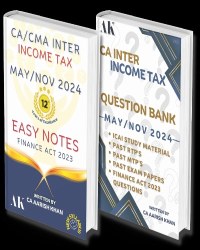
CA/CMA INTER COMBO - COLOURED EASY NOTES + QUESTION BANK
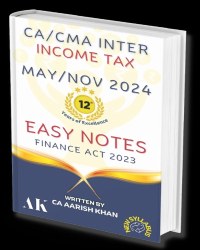
CA/CMA INTER EASY NOTES COLOURED
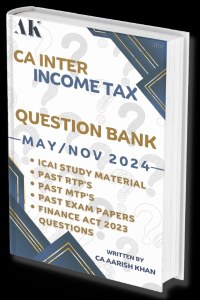
CA/CMA INTER INCOME TAX QUESTION BANK

GST (IDT) Book - 4th Edition | May, Sept 2026 & Jan 2027 Attempt
List your Books
Share your knowledge and help shape the next generation of tech-savvy CA & Tax professionals while building a rewarding career in education.
Get Started

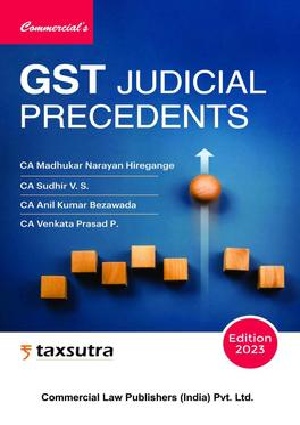
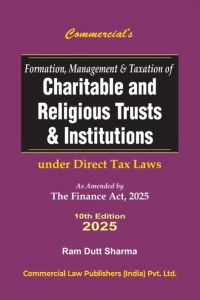
 CAclubindia
CAclubindia
